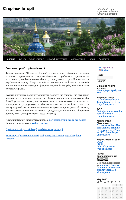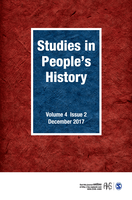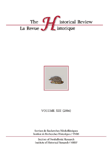
Storinky Istoriyi-History Pages
Scope & Guideline
Bridging Eras: Understanding Our Shared Heritage.
Introduction
Aims and Scopes
- Regional History and Politics:
The journal focuses on the historical and political developments in Ukraine and surrounding regions, examining significant events such as wars, revolutions, and state formations. - Cultural and Social Dynamics:
It explores the cultural transformations and social structures within various communities, including the impact of religious, ethnic, and social organizations on historical narratives. - Economic History:
The economic aspects of historical developments are a consistent focus, analyzing agricultural practices, industrialization, and economic policies throughout different time periods. - Methodological Diversity:
The journal employs a variety of methodologies, including qualitative analysis, archival research, and comparative studies, to provide comprehensive insights into historical phenomena. - Interdisciplinary Approaches:
There is an emphasis on interdisciplinary approaches that combine history with sociology, anthropology, and cultural studies, enriching the understanding of historical contexts.
Trending and Emerging
- Post-Soviet State Formation:
There is an increasing number of publications analyzing the post-Soviet transitions, particularly focusing on state-building processes, national identity, and sovereignty issues in Ukraine and its neighbors. - Cultural Memory and Commemoration:
Emerging themes include the study of cultural memory, memorial practices, and the commemoration of historical events, reflecting a growing interest in how societies remember and interpret their past. - Interethnic Relations and Minorities:
Recent trends highlight the dynamics of interethnic relations, particularly focusing on minority experiences and their roles in national narratives, addressing issues of identity and representation. - Impact of Globalization on Local Histories:
The journal is increasingly exploring how globalization has influenced local histories, examining the intersections of global and local narratives and their implications for historical understanding. - Environmental History:
There is a burgeoning interest in environmental history, looking at the historical interactions between humans and their environments, particularly in the context of Ukraine’s agricultural and industrial developments.
Declining or Waning
- Ancient History Studies:
There appears to be a waning interest in ancient history topics, with fewer publications addressing early historical periods or civilizations compared to the more modern historical analyses. - Traditional Military History:
Themes centered around conventional military history, such as detailed battlefield accounts or strategies, are less prominent, suggesting a shift towards broader socio-political analyses. - Biographical Studies of Lesser-Known Figures:
The focus on biographical studies of less prominent historical figures has diminished, possibly in favor of more comprehensive analyses of broader social movements and their impacts. - Local Historical Narratives:
While local histories remain important, there is a noticeable decline in papers specifically dedicated to micro-historical narratives, indicating a shift towards macro-level analyses. - Soviet Era Focus:
The emphasis on the Soviet period's specific events and narratives has lessened, as researchers may be seeking to contextualize such events within broader historical frameworks.
Similar Journals

REVUE D HISTOIRE MODERNE ET CONTEMPORAINE
Exploring the Depths of Modern HistoryREVUE D HISTOIRE MODERNE ET CONTEMPORAINE, published by the Société d'Histoire Moderne et Contemporaine, serves as a vital platform for scholars and enthusiasts in the field of history. With a focus on modern and contemporary historical discourse, this journal has been pivotal since its inception, aiming to promote research, analysis, and debate surrounding pivotal historical developments from the 1970s to the present day. While maintaining a Q4 ranking in History according to Scopus and a 49th percentile placement among arts and humanities journals, it continues to foster scholarly engagement across diverse topics within modern history. Although not an open-access publication, REVUE D HISTOIRE MODERNE ET CONTEMPORAINE offers researchers detailed insights that are crucial for understanding historical narratives and methodologies. Its location in the heart of Paris also symbolizes its commitment to accessing diverse historical perspectives. This journal invites contributions that expand the boundaries of contemporary historical study and enrich academic dialogue.

Journal of the Economic and Social History of the Orient
Connecting Scholars through Rich Narratives of the OrientThe Journal of the Economic and Social History of the Orient, published by BRILL, serves as an essential platform for researchers, historians, and social scientists interested in the economic and social dynamics of the Orient. Since its inception in 1957, this journal has contributed significantly to the understanding of historical economic structures and societal transformations, offering insights that engage a wide academic audience. With an ISSN of 0022-4995 and an E-ISSN of 1568-5209, the journal maintains a reputation for quality scholarship, as reflected in its Q2 ranking in History and notable standings in the fields of Sociology and Economics. Although it is not an open-access journal, it ensures accessibility to vital research through institutional subscriptions. By exploring diverse topics within the realms of economics, sociology, and history, the journal plays a crucial role in fostering academic discourse and enhancing knowledge regarding the complex historical narratives of the Orient.

HISTORIA MEXICANA
Cultivating Knowledge on Mexico's Historical JourneyHISTORIA MEXICANA is a prestigious academic journal published by the COLEGIO DE MEXICO CENTRO DE ESTUDIOS HISTORICOS that has been an open access resource since its inception in 1967. With an ISSN of 0185-0172 and an E-ISSN of 2448-6531, the journal serves as a vital platform for scholars dedicated to the exploration of historical studies, particularly focusing on Mexico and its broader context within Latin American history. As a testament to its scholarly impact, HISTORIA MEXICANA is ranked in the Q3 category in History according to the 2023 metrics and holds a Scopus rank of #582 out of 1760 in Arts and Humanities. This journal not only fosters rigorous academic discourse but also provides a unique repository of knowledge, bridging gaps in historical research and inspiring future studies in the field. Researchers, professionals, and students alike will find this journal an invaluable resource for deepening their understanding of Mexico's rich and complex past.

Transylvanian Review
Advancing Scholarship on Eastern European HeritageTransylvanian Review is an esteemed academic journal published by the CENTER TRANSYLVANIAN STUDIES, focusing on the fields of cultural studies and history. Since its inception in 2008, this journal has been committed to exploring the historical and cultural dynamics of Transylvania and the broader region, contributing to the scholarly discourse on Eastern European studies. Although currently classified in the Q4 quartile of both cultural studies and history in 2023, it serves as a valuable resource for researchers, professionals, and students aiming to deepen their understanding of cultural intersections and historical narratives. With its commitment to interdisciplinary approaches and rigorous scholarship, Transylvanian Review plays an essential role in fostering dialogue and insight within the academic community, and it aims to continue expanding its influence through accessible and impactful articles. Based in Cluj-Napoca, Romania, it enriches the academic landscape with a unique focus on regional studies.

Journal of Belgian History-Revue Belge d Histoire Contemporaine-Belgisch Tijdschrift voor Nieuwste Geschiedenis
Exploring the Depths of Belgium's PastThe Journal of Belgian History-Revue Belge d'Histoire Contemporaine-Belgisch Tijdschrift voor Nieuwste Geschiedenis is a prominent academic publication dedicated to the exploration and analysis of contemporary Belgian history. Published by SOMA-CEGES, this journal serves as a vital resource for researchers, professionals, and students alike, providing a platform for scholarly discourse and the dissemination of innovative research in the field. Despite its historical significance, the journal faced a hiatus in its Scopus coverage from 2019, yet it retains a strong identity within the Arts and Humanities category, holding a Scopus rank of #1123 out of 1328, placing it in the 15th percentile. This underscores the opportunities for growth and impactful contributions within the journal's scope. By focusing on the intricacies of Belgian history, the journal encourages rigorous investigation and a deeper understanding of Belgium's past, making it an essential reference for anyone interested in European historical narratives.

Skhidnoievropeiskyi Istorychnyi Visnyk-East European Historical Bulletin
Innovating Perspectives on Eastern European HeritageSkhidnoievropeiskyi Istorychnyi Visnyk-East European Historical Bulletin is a prominent academic journal published by Ivan Franko Drohobych State Pedagogical University, dedicated to the rigorous study and dissemination of historical knowledge in Eastern Europe. With an ISSN of 2519-058X, this Open Access journal has been serving the academic community since 2016, providing a platform for researchers, professionals, and students to share innovative findings and analyses. The journal is positioned within key academic categories, securing a rank of #704 in Arts and Humanities History and #222 in Arts and Humanities Archaeology according to Scopus, thereby reflecting its significance and impact within the field. The Skhidnoievropeiskyi Istorychnyi Visnyk invites contributions that expand upon the understanding of Eastern European history while fostering interdisciplinary dialogue, making it an invaluable resource for anyone engaged in historical scholarship.

Studies in Peoples History
Unveiling Narratives, Shaping HistoriesStudies in Peoples History is a noteworthy academic journal published by SAGE Publications India Pvt Ltd, dedicated to the exploration and analysis of historical narratives, social dynamics, and cultural transformations. With its ISSN 2348-4489 and E-ISSN 2349-7718, this journal serves as an essential platform for scholars and practitioners in the field of history and social sciences, fostering interdisciplinary dialogue and innovative research. Established in 2014, its relevance continues to grow, evident through its classification in category quartiles for 2023, ranking Q3 in History and Q4 in Social Sciences (miscellaneous), and Scopus rankings reflecting its emerging influence. Although the journal offers no open access option, it remains a critical resource for understanding people's history within the broader contexts of cultural and societal developments across the globe. The journal’s convergence of diverse methodologies promises to enrich scholarly discourse and supports the endeavors of researchers, students, and professionals alike throughout its projected run until 2024.

Historical Review-La Revue Historique
Innovative Perspectives on Timeless Narratives.Historical Review-La Revue Historique, published by the NATL HELLENIC RES FOUNDATION, is a premier open-access journal focusing on the multifaceted field of history. Established in 2004 and operating out of Greece, this journal serves as a platform for the dissemination of scholarly research, critical essays, and innovative perspectives on historical events, figures, and themes. Though it has transitioned through different stages in its indexing, including a hiatus from Scopus coverage between 2009 to 2021, it has successfully maintained its presence in the academic community, evidenced by its current Q4 classification in the history category of Arts and Humanities. With an ISSN of 1790-3572 and an E-ISSN of 1791-7603, the journal continues to foster rich academic dialogue and inquiry, making research accessible to a wider audience. As a valuable resource for researchers, educators, and students, Historical Review-La Revue Historique contributes significantly to the understanding and appreciation of historical narratives and methodologies.

Revista Portuguesa de Historia
Fostering Excellence in Historical DiscourseRevista Portuguesa de Historia, published by the esteemed Universidade de Coimbra, Faculdade de Letras, is a prominent open access journal dedicated to the field of history. With an ISSN of 0870-4147 and an E-ISSN of 2183-3796, this journal serves as a vital resource for historians and scholars engaged in historical research. Since its transition to open access in 2016, the journal has expanded its accessibility, allowing a wider audience to engage with high-quality research findings. With an impressive Q2 ranking in the History category for 2023, it is positioned within the upper echelons of historical scholarship, reflecting its commitment to excellence. Covering a comprehensive spectrum of historical studies, the Revista Portuguesa de Historia is ideal for those seeking to explore diverse perspectives and methodologies in history, contributing significantly to the academic discourse in this dynamic field.

JOURNAL OF ASIAN HISTORY
Connecting Cultures Through Historical InsightsJOURNAL OF ASIAN HISTORY, published by VERLAG OTTO HARRASSOWITZ, stands as a significant academic platform dedicated to the exploration of Asia's rich historical tapestry. With an ISSN of 0021-910X and spanning multiple fields including Cultural Studies and History, this journal offers valuable insights for researchers, professionals, and students alike. Notably ranked in 2023 within the Q2 category in History and showcasing a diverse range of scholarly contributions, it is pivotal for advancing knowledge within Asian historical contexts. Though not open access, the journal facilitates critical discourse through comprehensive articles that deepen the understanding of Asia's complex socio-political landscape. With its operational presence in Germany, the journal continues to uphold academic rigor and contribute to the global scholarship on Asian history.